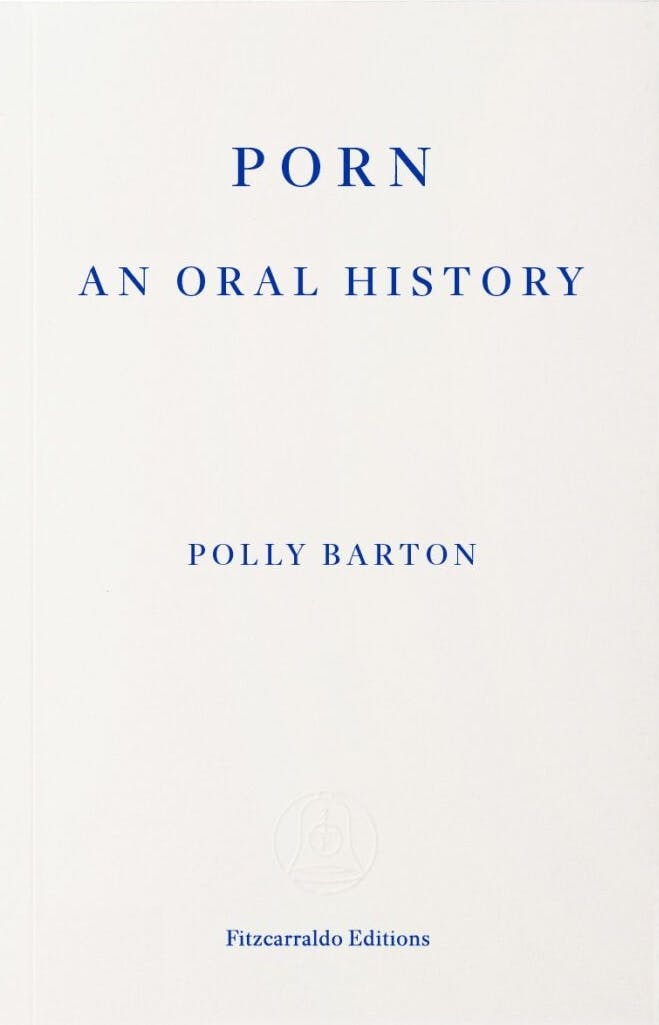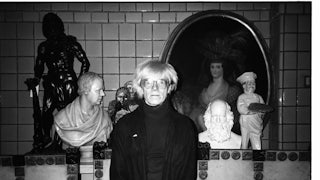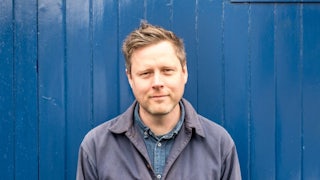There is a type of man who appears again and again in the conversations in Polly Barton’s Porn: An Oral History, in which Barton interviews 19 people about their views on and experiences of porn. A man who is well versed in feminist theory and takes care to enthusiastically perform his solidarity with women but who also, in private, watches and masturbates to the kind of porn which one might find online by searching “gang-banging a slut who was gagging for it, etc” as Barton puts it in one conversation. In another she says: “It makes me angry to think about men pretending to be all woke and then actually behind closed doors getting off to ‘Blonde Slut Gets Pummeled by my Monster Cock.’” In a further example she explains: “There’s a part of me, even now, that finds it really troubling that someone I am in a relationship with might be watching and getting off on something that I find really misogynist and degrading, and then coming back to me and playing the good feminist, you know?”
If this type of man exists, and I think he does, I would argue that he is only one manifestation of the widening split that easily accessible online porn has facilitated in the past few decades: the split between what we may profess, or imply, our desires and sexual appetites to be publicly, and even in our most intimate relationships, and what our actions, when we are alone, might suggest these really are. It is true that erotic material long predates the internet, and that the porn industry has a long analog history. But the internet age has seen the dissemination of a great volume of porn, and of increasingly extreme porn, which can be accessed with relative ease, in secret, even by children. Barton’s anxiety about the type of man who publicly proclaims his feminism while privately searching “gang-banging a slut” speaks to the wider sense of unease this has engendered. We all know, for example, that the worst kind of porn, many grades worse than “gang-banging,” only exists because some people like to watch it. But who?

This secrecy, coupled with the assumed ubiquity of porn, is the subject that animates Porn. Barton is a writer and translator who has translated numerous Japanese novels to English. She won the Fitzcarraldo Editions Essay Prize for her first nonfiction book, Fifty Sounds, a personal account of her interest in the Japanese language and her time living in Japan in her twenties. Around the time of the pandemic, she writes in her introduction, she found herself drawn to thinking about porn and the veil of secrecy that sits over it. “I worried about what porn stood for, I worried about what it has done to us, is doing to us and will do to us, and I worried that this worry made me a bad feminist,” she writes. She started thinking about how she might embark on a book to investigate how we really use and think about porn.
She felt ill equipped to conduct a comprehensive academic survey, which would necessitate asking a large number of subjects formulaic questions. Instead she came to the idea of interviewing a group of her friends, acquaintances, and colleagues. Intimate, honest conversations about porn were what she felt she was missing, and what she thought other people might be missing too. This idea of secrecy, and the related shame, comes up again and again in the conversations in Porn, and is often much more entrenched than I would have anticipated. One of the things that surprised me most is that several of the subjects say they have never discussed porn (and sometimes even masturbation) with anyone, even with their own partners when in long-term relationships. Porn, though widespread and widely accepted, even celebrated, in the abstract, appears to have remained unspeakable for some (maybe even many) people.
Barton emailed a number of her contacts to see who might be willing to take part, and the resulting book consists of the transcripts of 19 conversations, which feel frank, refreshing, and often surprising. Each of Barton’s subjects is anonymous, which I believe is essential for the conversations to be basically honest. They are described only by skeleton information about their race, age, sexual orientation, and relationship status. (Although their life experience and the kind of work they do comes up in the conversations.) There are nine men (including one transgender man), nine women, and one nonbinary person. Some interviews are quite similar in their scope and perspective, and the type of person interviewed is reflective of Barton’s milieu (academics and people who have lived in Japan and work in teaching or translation are very well represented). But I found that, even when certain conversations covered similar ground, the overlap was actually instructive.
Several of the women here, for example, discuss their struggle to find porn that does not present only a narrow demographic of women, or frame women in a degrading fashion, but that they also find titillating. Subject FOUR, a queer, married American woman in her thirties said that she finds porn with a professed “inclusive, body-positive ethic” to be “just as alienating” as more mainstream porn. “I feel it ends up being normative in its own way. It’s all women with lots of tattoos and blue hair. It purports to be inclusive, but it feels very narrow in what it offers,” she says. Subject ONE, a straight woman in her late thirties with children, says essentially the same. “I know that there’s porn that’s made for women, but it doesn’t do it for me,” she said. “I’ve also found that even as I’m living in this body, I wouldn’t want to watch someone who looks like me having sex. I wouldn’t want to watch someone who has a little roll of stomach having sex. And yet I want to have sex, stomach and all. So I find that really disappointing of myself.”
Barton draws no judgment about this, or much else in the book. She does not annotate the interviews, and one of her skills as an interviewer is that she does not moralize at her subjects and avoids steering their answers. But Porn has the quality of a good novel, in that while reading it you often notice small details or perspectives which make you think about the world, or your own life, differently, without having a lesson overtly spelled out to you. It struck me while reading the above conversations, for example, that theoretically open, progressive public discourse around porn can have almost the same silencing effect as no discourse at all. In the sense that, when a consensus emerges on the progressive perspective to hold on a certain aesthetic of porn, it will change the way we speak and what we admit to, but perhaps not how we feel. I found myself wondering too if this kind of progressive consensus can have negative outcomes as well as positive ones. ONE knows intellectually that she’s supposed to enjoy body-positive porn. But she doesn’t. The only thing that knowing she’s “supposed to” seems to have done is make her disappointed in herself. Confessions like these throughout Porn reinforce the strength of Barton’s chosen format of intimate, private conversations.
Porn is full of moments and observations like these, which spark trains of thought that can hurtle off to various locations. It is a tricky book to write about because of this generative quality, and because the sentiments that strike me as particularly consequential maybe appear banal to a different reader. In fact, the disparateness of our perspectives on and experiences of sex and porn, alongside the fact we mostly assume ourselves to be the norm, is something I was routinely reminded of while reading Porn.
For this reason some of the most striking conversations, to me, were with subjects who sit outside my demographic. ELEVEN is a straight British man in his eighties with a partner. His conversation covers the release of Lady Chatterley’s Lover in 1960, and how groundbreaking that felt at the time. He says it “was the beginning of the so-called permissive age of the sixties. You could now get a book where you could read those two words [fuck and cunt], along with fairly explicit descriptions of sex. That led to books like the Kama Sutra, My Life and Loves by Frank Harris and Fanny Hill being published.”
He recounts his early experiences of watching porn, in the early 1980s when he was in his forties. “The first time I saw good-quality hard porn was with a group of guys from work,” he says. He was invited around to a colleague’s house on a Friday to watch porn and eat fish and chips. “It was really a shock. You couldn’t quite believe what you were seeing: did that guy just put his cock into that woman’s cunt?” he says. But he explains, convincingly, that he thinks society now is “not quite as liberal” as it was in the sixties because sex and porn are more privatized, and so compartmentalized, in the internet age. “When you watch pornography, you’re watching pornography,” he says. “Whereas somehow in the sixties, you had a truly liberal society, because it was happening on all fronts—fashion, music, theatre, arts, literature, everything you could think of was moving forward. Opening up new ideas and trying out new things.”
I was struck too by many comments made by FIVE. FIVE is a single man in his early twenties, less than a decade younger than I am, so theoretically demographically similar, but of a generation which I perceive to be totally, horrifyingly, saturated in the internet. I was pleasantly surprised to find he was much more thoughtful and reflective than I had anticipated. “I think the media has really affected how sex and OnlyFans and porn are viewed,” he says. “You’ve got shows like Naked Attraction and all these different shows that are—I don’t want to say dehumanizing—but certainly desensitizing our sense of what sex is. It’s almost treated as a novelty on the telly. ‘Pick which one of these six guys you like from their dick.’ It’s absolutely horrid.” And, where I had thought a lot about how the ubiquity of porn impacts the body image of teenage girls, I realized while reading his conversation that it had not occurred to me that teenage boys may feel similarly. “The dick size in porn is just absolutely unrealistic,” FIVE says at one point. “Half of them are the size of my arm: not even to the elbow, the whole arm. Especially when I was younger, that was something that I was really aware of.”
Even in conversations with subjects who are demographically similar to me (women in their late twenties and thirties) I found myself surprised and reminded of the fallacy of that presumption that our sexual experiences are the norm. In several interviews a subject says something that, to me, feels very particular to their experience, and then says they assume this is how most other people feel too. At one point, for example, SIXTEEN, a single woman in her late thirties, says: “The focus, in so much porn, even that which advertises itself as made for women, seems to be on penetration and finding penetration pleasurable in a way that I don’t think many people do.” The idea that women broadly do not find penetration pleasurable seems to me a wild generalization, but if this is one person’s experience, I realized, they have no reason not to expect it to be broadly true.
The interviews in Porn demonstrate how easy it is for any of us to operate with our own system of myths and half-facts about sex and porn, even in the internet age when we can theoretically look anything up, because we mostly don’t talk about it. Information about something like this may technically be accessible, but there can be a comfort in assuming our experiences are universal, especially those which are painful or difficult, which might prevent a person from seeking it out.
There was much in SIXTEEN’S interview that I found myself mentally arguing with, ferociously at times. At one point she describes a woman she follows who writes erotic blogs. This person, SIXTEEN explains, once wrote an advert for a vibrator in which she detailed her heartbreak over a recent breakup. SIXTEEN presents this as an admirable example of ethical porn. “That’s what ethical porn looks like, for me: a real person who is transparent about the way what they’re doing is produced,” she says. To my mind this demands an alarming level of access to, and personal information about, the person making pornographic content. But moments like this, when I found myself reading a perspective I couldn’t fathom agreeing with, are the strength of Barton’s excellent book. She has brought a series of what feel like genuine and genuinely conflicting perspectives together. Porn has the salacious quality of gossip, but it has the confronting quality gossip can often have too.
Beyond being simply a book about porn, Porn often feels like a frank account of some of the stranger, less-discussed elements of what it means to be a human in the internet age. It reminded me most of Nell Dunn’s brilliant Talking to Women, which consists of the transcripts of conversations conducted between Dunn, a playwright and novelist living in London, and each of nine of her female friends in 1964. In these conversations, mostly conducted over a bottle of wine, Dunn and her friends, a mixture of artists, writers, and factory workers from varying class backgrounds, discuss their lives as women living through a time of major societal change. Reading Porn is a reminder that, in the internet age, we are living through a major societal change too.
There is a criticism to be made of Porn, which Barton articulates too in her introduction. Her conversations are, by their nature, only a patchwork account of how we use porn and are limited by the constraints of her social and professional circles. “Porn and ethnicity deserves a far, far better exploration than I have been able to give it within this book, as does porn and socio-economic class, and body image,” she writes. I felt speaking to a broader sample of straight men too may be interesting in terms of precisely the anxiety that Barton repeatedly articulates, about men who have learned to perform their feminist credentials. The five straight men she interviews all seem very cognizant of current feminist thinking on porn and are adept at referring back to this while discussing their own views and habits. Maybe this is the way they truly think, but I would be interested to read more from those who are less steeped in theory. It would be unpleasant perhaps, but honest at least.
Universality is, however, too big a demand to place on any book. If a comprehensive account of how we use porn is ever to exist then a book like Barton’s has to first. Probably several versions of it, actually.






